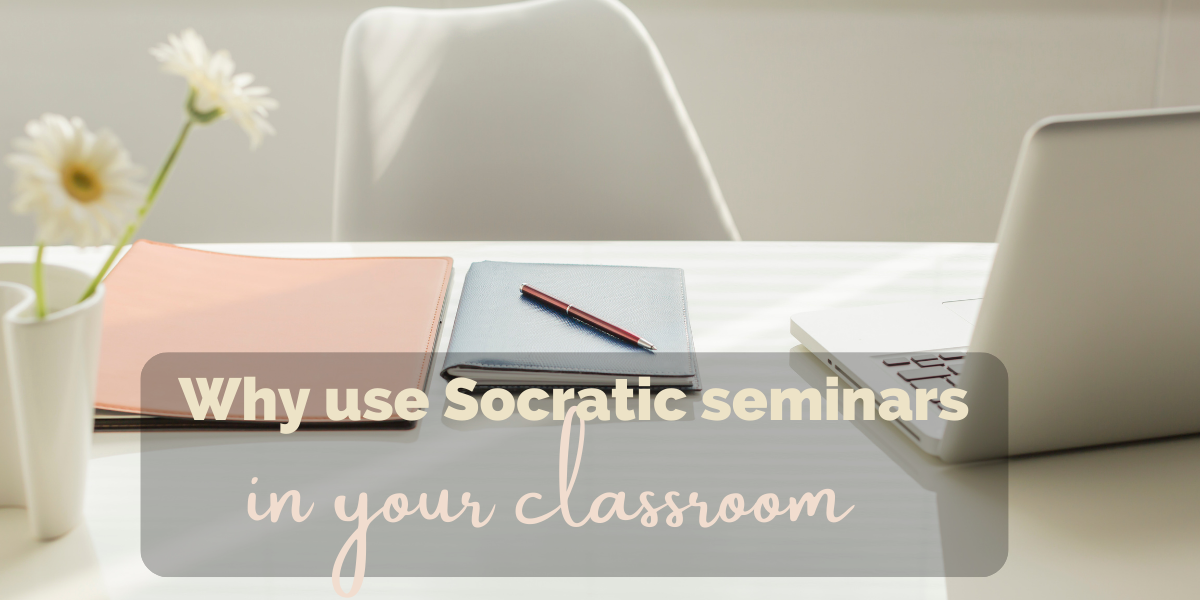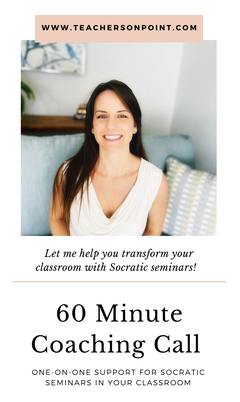|
There used to be many different reasons to use the Socratic method in classrooms, but after the response to the pandemic and holding kids in their homes and OUT of the classroom for years, it's become even more crucial of a method of teaching. Below I talk about what Socratic seminars are, why they are beneficial to students of upper elementary all the way through high school and how you can begin to use this method in your classroom. What are Socratic seminars?Socratic seminars are a method of teaching that essentially put the "teaching" into the hands of students through classroom discussions. It's facilitated by the teacher, but directed by the students. They come to class prepared by having done a teacher selected reading or video, perhaps even listening to a podcast or solving a math problem. Students also will have completed some of, what I like to call, "thinking work" which could be in the form of notes, questions written out or even summaries of their understanding. The class comes together in a circle with their prepared work and they have a discussion. This can be done with any subject. In math for example, students will discuss the different strategies they used to solve a problem. The class will critically think about the different ways people solved for an answer and decide two things: which method makes the most sense to them and two: do the methods being discussed solve the problem correctly. In Language Arts, Science and Social Studies, the students are thinking critically about the information they learned. In reading for example, they are asking each other to explain the thinking because most of the time, students have thought differently about the text. They articulate their use of comprehension strategies in a natural way as they are being asked questions or simply asked to explain their thinking. So how is this beneficial to students?Socratic seminars benefit students in a number of ways. For one, it's been obvious to anyone who works with kids recently that they are sometimes literally unable to articulate their thoughts. We can look at research or just use our common sense to conclude that before we had the pandemic, where kids were housebound and cut off from their peers and school, we had technology playing a part in their everyday lives in a way that didn't require them to communicate verbally with each other. And these things were taking over. Apps such as Discord, video games, text messaging and social media have created a paralyzation in verbal communication. Add to the fact that many kids were told they could not see or play with their friends and they would also be kept from the classroom, well, it was a recipe for disaster. And we, as teachers, are in a position where we can help our students gain back these very important necessary skills. Where can you start? How to Implement Socratic seminars into your classroomIf you haven't already, download the free conversation poster and discussion packet from my website. These two teaching tools will help guide you in having your first whole class discussion (Socratic seminar) with your students.
Day One 1. Get your students to buy into this method. Chances are, it won't take much because kids love to talk and to feel like they are in charge. Two things they get to do with this method of teaching. 2. Display the conversation poster and explain that they will be holding a conversation without much direction from you AFTER they show you that they can follow these steps. The poster explains what to do if you are a speaker and what to do if you are listening. Go through each one very explicitly, no matter what grade you teach. Day Two 1. Set your class up to be sitting in a circle and read a short picture book. I loved reading the Junkyard Wonders by Patricia Polacco as it creates strong feelings within the readers. However, you can choose any book that you think will illicit opinions and strong feelings. 2. Remind students of the poster you shared with them yesterday. (This should stay hanging up in your classroom.) 3. Refer to the questions packet and tell your students that, to start, you will be asking the questions and for them to answer WITHOUT raising a hand. (You will want to have a quick overview of what to do if two or more people want to talk at once)Their job is to then respond to the answer to the question. 4. As you begin to ask the questions and students are answering and responding to each other, stop at any point where they are not following the poster norms. For example, without a doubt, students will look only at you when responding. Stop the student immediately (this reinforces the importance) and remind him that he should be looking at EVERYONE, not just the teacher because he wants his peers' response, not yours. This will then get the kids to start to realize that you aren't joking. This is not a time in the day where you are the one they should be focusing on. No, it's time now for them to focus on each other and learn from each other. As you practice this method, keep coming back to the poster norms and allowing students to make mistakes, but encouraging them along the way. If you would like more support with this, sign up for my live one-on-one coaching session. Here we will discuss your students specifically and the needs of your classroom. We can troubleshoot or I can even help you to get started. Click here.
0 Comments
Leave a Reply. |
Julia GrahamDaughter of the King, wife and mother, former upper elementary teacher, curriculum and course developer Archives
March 2023
Categories
All
|
Pages |
Resources |
|




 RSS Feed
RSS Feed